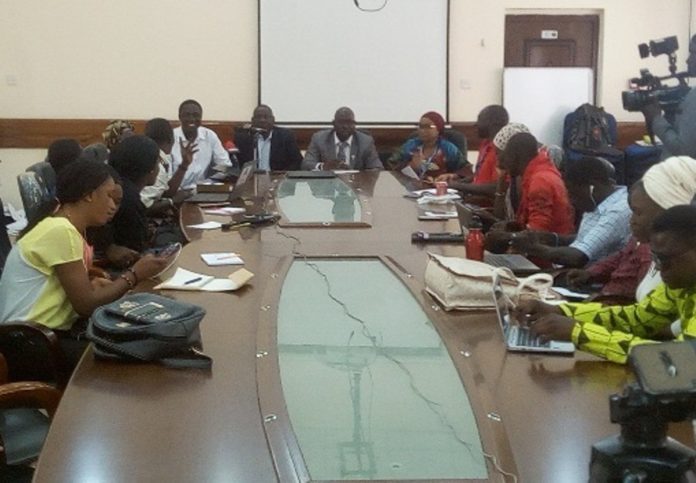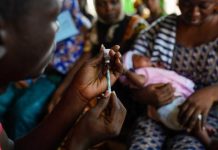By Ndey Sowe
The Ministry of Health on Thursday January 24th 2019, held a press briefing on the forthcoming Nationwide Meningitis vaccination, vitamin A supplementation and deworming campaign.
The press briefing which was held at the National Malaria Control Programme (NMCP) office in Kanifing,
Disclosed that the campaign will take place from the 2nd to the 8th of February 2019, and it is geared towards protecting children against meningitis, vitamin A deficiency and worm infestation.
According to officials, the aim of the campaign is to eliminate epidemics of meningococcal meningitis due to sero-type A in the Gambia; that the campaign will target all children aged 1 to 7 years for Meningitis A vaccine (416,613), 6 to 59 months for Vitamin A (373,381), and 12 to 59 months for Mabendazole (314, 426).
It was disclosed that the vaccination team will visit the whole country, and will be stationed at strategic locations such as village bantabas, market places, health centers, crossing points, community centers and Schools, to ensure that no child aged 1 to 7 years old, is missed. It was stated that the target group for the campaign is children between 1 to 7 years who should receive the Meningitis Vaccine; adding all children aged 6 months to 5 years should be given the Vitamin A capsule once every 6 months. According to the information, infants aged 6 to 11 months should be given the blue capsule once, while children aged 1 to 5 years should be given the red capsule once every 6 months.
According to the officials at the press briefing, “Meningitis” is an infection that affects the brain, and can kill an infected person, if not treated immediately; that it can lead to deafness, dumbness and blindness, and can affect mental health even after recovery and children are usually the most affected.
Saharu Kanteh the Communications officer at the Expanded Programme on Immunization (EPI) project said Meningococcal Meningitis/Cerebro-Spinal meningitis is a contagious bacterial infection that occurs sporadically, throughout the world; that the disease can be transmitted from person to person through droplets of respiratory or throat secretions from carriers, and the infection can also occur by close respiratory contact with infected individuals. Kanteh cited that in the Gambia, epidemic records have shown that sero-type A is the predominant type responsible for epidemics.
He however said in August 2012, an epidemic of W135 was experienced in the Gambia, with 175 cases and 9 deaths recorded; that as a result of this, the Gambia successfully implemented a campaign in November 2013, targeting the population between 1-29 years old.
“In 1996/7 epidemic seasons, the country experienced the worst epidemic causing 1,685 cases and 222 deaths, with a case fatality rate (CFR) of 13. 1%. During this season, the Upper River Region, one of the highest risk regions, recorded 1,390 cases and 168 deaths with a case fatality rate of 12%,” he said.
He further indicated that from November 2000 to March 2001, 137 cases including 21 deaths were recorded, and the disease mainly affected small children; that this does not mean that it cannot affect older children and young adults. He said reduced immunity, overcrowding and dry season, predisposes epidemics.
“The Ministry of Health and Social Welfare together with partners such as the WHO, UNICEF and others, plan to conduct this campaign from February 2nd to the 8th 2019, to pave the way for the routine introduction in March 2019,” he said.
Kanteh continued that in order to reach their target, two strategies will be used. He concluded to say that they solicit the support and cooperation of the authorities in schools and communities for a successful campaign as well as the media.
Other speakers include Sanjally Trawally, Acting Director for Health Promotion and Education and Buya Jalllow, Immunization Officer at UNICEF.





















